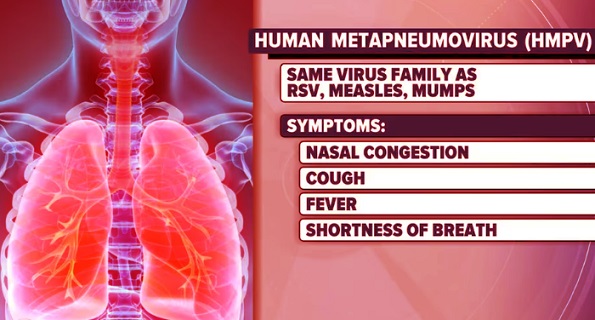Nikhil Prasad Fact checked by:Thailand Medical News Team Dec 31, 2024 3 months, 1 week, 6 days, 15 hours, 2 minutes ago
Medical News: Insights into a Respiratory Threat and Its Spread
Human metapneumovirus (HMPV), first identified in 2001, is a significant cause of respiratory infections worldwide. While much research has been devoted to its impact on children and vulnerable populations, a critical factor in understanding its transmission and containment lies in its incubation period. This
HMPV News report delves into recent studies exploring this vital aspect of HMPV and provides a detailed understanding of its implications for public health.
 Understanding the Human Metapneumovirus Incubation Period
A Closer Look at HMPV
Understanding the Human Metapneumovirus Incubation Period
A Closer Look at HMPV
Human metapneumovirus belongs to the Pneumovirinae subfamily within the Paramyxoviridae family. It is closely related to respiratory syncytial virus (RSV) and primarily affects the respiratory system. Its genome consists of negative-sense single-stranded RNA, encoding proteins essential for its replication and spread. The virus is classified into two genotypes, A and B, further divided into subgroups A1, A2, B1, and B2. These variations often co-circulate, but one genotype typically dominates during an epidemic.
HMPV is a leading cause of respiratory illnesses, particularly in children under five years old. It is responsible for conditions ranging from mild upper respiratory tract infections to severe bronchiolitis and pneumonia. Re-infections are common throughout life due to incomplete immunity, making it a recurring health concern. In adults, HMPV infections can be mild but are often more severe in the elderly and immunocompromised.
Decoding the Incubation Period
Understanding the incubation period - the time between exposure to the virus and the onset of symptoms - is crucial for managing and controlling the spread of hMPV. Studies conducted by researchers from Yamagata University Faculty of Medicine, Yamanobe Pediatric Clinic, and the Yamagata Prefectural Institute of Public Health in Japan have shed light on this aspect. These institutions collaborated to analyze HMPV infections among family members in Japan during 2008 and 2010, focusing on transmission dynamics within households.
The findings reveal that the median incubation period of HMPV is approximately five days, with a range of three to seven days. The study emphasizes that such knowledge helps in designing effective quarantine and preventive measures to curb outbreaks. The study also highlights the role of school-going children as index cases, often transmitting the virus to younger siblings and adult family members.
Study Highlights
The Japanese study examined 15 families where multiple members were diagnosed with hMPV. Nasopharyngeal swab specimens were collected and analyzed using real-time PCR to confirm the presence of the virus. Key findings include:
-Demographics: The index cases ranged from 2 to 11 years old, with a median age of 5 years. Contact cases included individuals aged 2 months to 46 years, with a median a
ge of 6 years.
-Transmission Dynamics: Younger siblings and infants, often cared for at home, were most susceptible to infection from index cases. Adults also contracted the virus but exhibited milder symptoms.
-Serial Interval: The interval between symptom onset in index cases and contact cases averaged five days. This interval is pivotal in assessing the contagious period of the virus.
-Symptoms and Severity: Most cases involved upper respiratory infections, but a small number of children developed bronchitis or bronchiolitis. Fever was common among index cases, while contact cases experienced varied symptoms, including cough and mild fever.
Phylogenetic analysis of the virus isolates revealed distinct genetic sequences, underlining the presence of multiple circulating strains within the community. These findings underscore the complexity of controlling hMPV outbreaks.
Implications for Public Health
The insights into hMPV's incubation period have broad implications for managing respiratory infections globally. Key takeaways include:
-Prevention in Schools: Children in schools and daycare settings are primary vectors of transmission. Enhanced hygiene practices, regular health screenings, and temporary isolation of symptomatic children can reduce spread.
-Quarantine Guidelines: Knowledge of the incubation period helps define optimal quarantine durations for exposed individuals, minimizing transmission risk.
-Focus on Vulnerable Groups: Infants, the elderly, and immunocompromised individuals are at higher risk of severe infections. Targeted protective measures, such as vaccination once available, will be critical.
-Preparedness in Healthcare Settings: Hospitals and care facilities must adopt stringent infection control practices to prevent nosocomial outbreaks.
Broader Context of hMPV Research
In addition to the Japanese study, research from KIIT University in India and the Federal University of Paraíba in Brazil highlights the virus's global distribution and seasonal patterns. hMPV peaks during late winter and spring in temperate regions, coinciding with other respiratory viruses like influenza and RSV. The incubation period aligns with observations from nosocomial and community-based studies worldwide, reinforcing its relevance across diverse settings.
Conclusion
The incubation period of human metapneumovirus is a critical parameter in understanding its transmission and impact. Studies have consistently shown that the virus’s median incubation period is about five days, with a range of three to seven days. This knowledge enables public health authorities to design targeted interventions to curb outbreaks, protect vulnerable populations, and guide future vaccine development efforts.
The collaborative research efforts from Yamagata University, KIIT University, and the Federal University of Paraíba exemplify the importance of global cooperation in addressing respiratory health challenges. While much progress has been made, continued research is essential to fully unravel the complexities of hMPV and develop effective preventive and therapeutic strategies.
References:
https://www.cambridge.org/core/journals/epidemiology-and-infection/article/human-metapneumovirus-infection-among-family-members/F94065BEF6ADB3E2FF25194E0616F904
https://www.mdpi.com/1999-4915/5/1/87
https://www.sciencedirect.com/science/article/pii/S120197121401488X
For the latest
HMPV News, keep on logging to Thailand Medical News.
Read Also:
https://www.thailandmedical.news/news/human-metapneumovirus-hmpv-can-cause-neurologic-issues
https://www.thailandmedical.news/news/scientists-from-chile-discover-that-human-metapneumovirus-infections-also-affect-both-innate-and-adaptive-intestinal-immunity
https://www.thailandmedical.news/news/israeli-study-finds-that-human-metapneumovirus-uses-unique-strategy-to-escape-recognition-by-nk-cells
https://www.thailandmedical.news/news/louisiana-study-finds-that-human-metapneumovirus-uses-mirnas-to-impair-immune-responses-involving-interferons
https://www.thailandmedical.news/news/human-metapneumovirus-infections-on-the-rise-in-china
